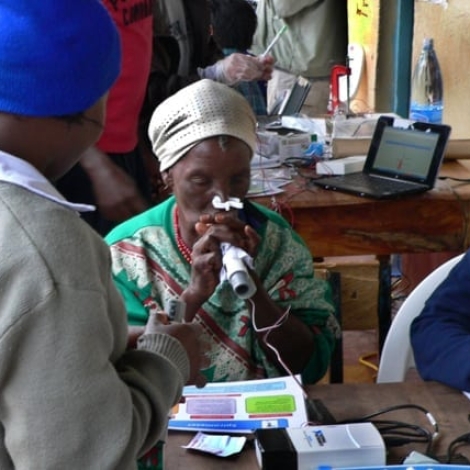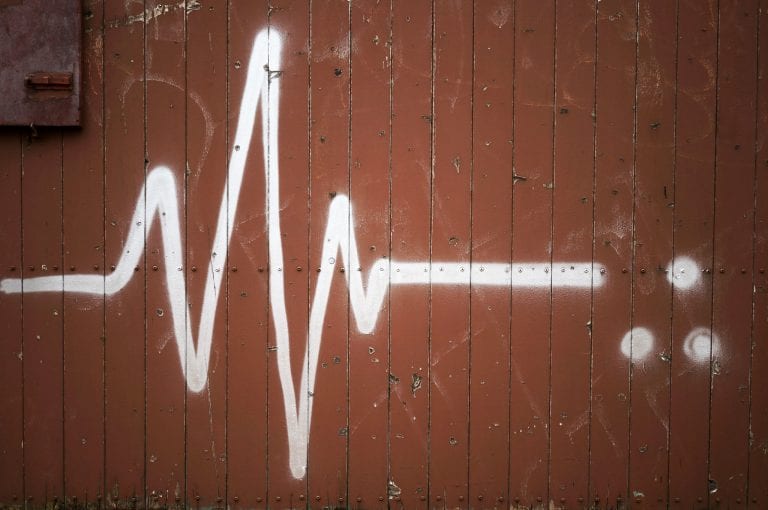
Photo courtesy of Khanjan Mehta
For some people living in rural East Africa, seeing a doctor takes four days and a week’s worth of pay. Doctors are that scarce. While the United States has one doctor for every 400 people, Tanzania has only one for every 50,000 people, and Malawi, one for every 100,000, the World Health Organization reports.
Yet East Africa is connected to the world through cell phones. Nearly everyone has access to one. Now some faculty and students at Penn State want to use those cell phones as a lifeline to link patients to doctors. (See our Solutions Library for more on low-cost telemedicine.)
The Penn State team developed a contingent of cheap, reliable medical devices that digitize the data they collect and lock it away in a virtual waiting room – a server. Once there, doctors can look at it from anywhere in the world. Based on the readings and phone-sent photos, doctors can suggest a course of action. The project is called Mashavu, Swahili for “chubby cheeks,” as in healthy, chubby-cheeked children.
Cheap, Durable and Digital
The team’s innovations are two-fold: cheap, durable devices and software that processes their readings. A computer transmits the information over the Internet through a cell phone.
The devices and software form the backbone of remote medical services for stranded rural communities. So far, the devices include a scale, thermometer, pulse rate monitor, stethoscope, blood-pressure monitor and spirometer (which measures lung capacity).
To slash costs, the designers stripped the instruments down to little more than sensors that shuttle the information they collect into a computer. The Penn State team’s open-source software sorts out the signals and does the work that more expensive devices do on their own.
The devices themselves are made of common materials such as plastic pipe, cardboard and Velcro that are easy to fix or replace. The average instrument costs less than $10, about one-tenth as much as its over-the-counter equivalent.
30 years since the last check-up
The team field-tested their inventions in Kenya last summer. At one point, so many people lined up to learn their weight, blood pressure and lung capacity that Khanjan Mehta, the Penn State senior research associate who leads the project, had to cordon them off. Illustrating how rare medical services are, Mehta met one man who said that he hadn’t had his blood pressure taken since the 1970s.
Mehta’s goal is to create a self-sustaining medical service that pays for itself rather than relying on charity or volunteers. Even when charged a little less than $1 for a check-up (in a country where $1 is a daily living wage), the villagers still formed lines.
Lessons Learned: Wonky-sized pipes and African dust
After the field test, the team mostly scrapped its original idea of recruiting international doctors to give advice remotely. “That opens a whole can of worms,” Mehta said, pointing to language and cultural barriers. Instead, they are considering paying regional doctors a cut of the earnings for taking part.
They also discovered a flaw in using local materials to build medical devices. “The basic problem is that there’s absolutely no quality control,” Mehta said. He couldn’t buy two pipes with the same dimensions from local hardware stores, so making accurate medical devices would have been tough. Instead of producing them locally, the team plans to produce them in city centers, perhaps in other parts of the continent or even abroad in China – wherever it can be done on the cheap.
A third lesson: “Africa is incredibly dusty,” Mehta pointed out. That led to at least one design change: the spirometer now has a detachable head that can be rinsed in water.
Set It Up and Get Out
The team would like to piggyback their medical kiosks onto new rural power stations. The United Nations is electrifying the countryside with green-energy generators. “Our goal for next summer is to have three fully functional Mashavu kiosks at UN power stations,” Mehta said.
“At that point we want to transition out of it,” he added. The Penn State team would like to leave the project in the hands of NGOs or local entrepreneurs. Then they’ll turn their minds to the next project: an African text-messaging service for job-hunters.
Related news
How advances in long-distance Wi-Fi can connect rural areas cheaply
How mobile games teach HIV prevention
From the Solutions Library: Rural healthcare delivery using telemedicine


